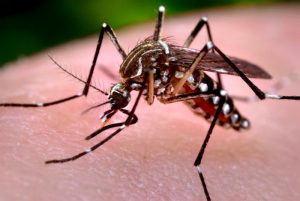NewsDesk @bactiman63
Since last year, a high incidence of dengue cases has been noted , and it has increased in recent days, especially in minors, according to a El Nuevo Dia report.

Dengue is an acute viral disease transmitted by the bite of the Aedes aegypti mosquito. In Puerto Rico, it is endemic, that is, cases are reported throughout the year.
According to the Department of Health ‘s Weekly Arboviral Disease Report, last year, 574 confirmed and 63 probable cases of dengue were reported. In addition, there were 261 related hospitalizations, 73 severe cases and two deaths from this disease.
So far this year, six confirmed cases, two hospitalizations and one severe case, has been reported. The confirmed cases have been in Toa Alta, Bayamón, San Juan, Canóvanas and Humacao.
Pediatrician, Dr. Fernando Ysern said that there is an increase in cases, especially since August. “Every five to seven years, a peak of dengue comes. We haven’t gotten there, but we are ‘due’ (in expectation) of a dengue outbreak,” he said.
The Centers for Disease Control and Prevention warn that one in four people infected with dengue gets sick, and one in 20 has a serious condition.
Subscribe to Outbreak News TV on YouTube
- Denmark: Omicron BA.2 is expected to account for up to 100% of infections in mid-February 2022
- Japan COVID-19 cases top 3 million, 1 million cases reported in 2 weeks
- New Zealand to start phased in reopening of borders
- Sweden: ‘The pandemic isn’t over, but it is moving into a new phase’
- Drug resistant Shigella infections in MSM on the rise in the UK
- New York City reports increases in sexually transmitted infections (STIs) in females
- Lockdowns had no noticeable effect on COVID mortality: Johns Hopkins study
- India Newswire: Rare chickenpox deaths in Karnataka, Leprosy situation


Our research teams have conducted spot surveillance for mosquito breeding sites throughout the Caribbean Basin for several years, with multiple visits to San Juan, Puerto Rico. In San Juan, we have recorded many good control measures to eliminate breeding sites for Aedes aegypti, which is the most important vector for dengue and other diseases, including Zika virus. One point that needs further attention from local public health authorities is water accumulated in water meter wells, which are always in areas of human activity. We will be conducting a new spot site check in San Juan this winter to monitor this source of potential disease transmission, and urge local authorities to engage measures to control mosquito breeding in these settings.